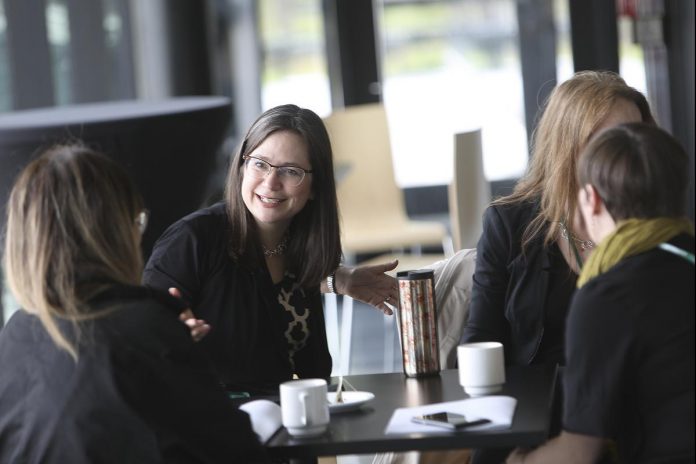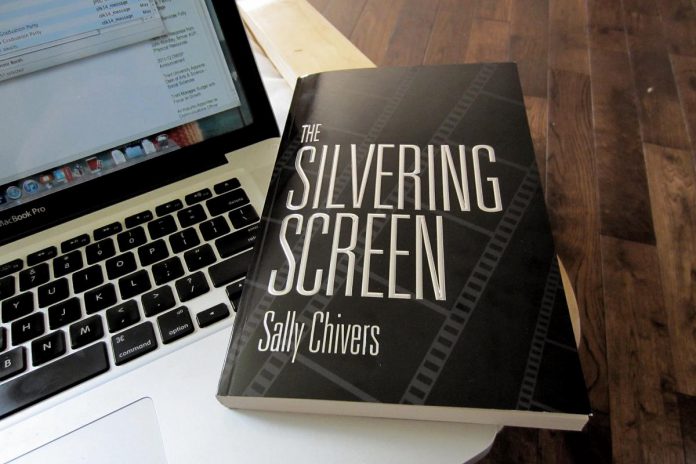
Don’t panic! It’s just aging.
Sally Chivers, professor of Gender & Social Justice and English Literature at Trent University, is here to tell you why in season two of her podcast called “Wrinkle Radio.” Launching soon, the second season will introduce all-new topics on aging in culture with insight from professional academics, scholars, and researchers.
Proving you only get wiser and better-looking with age, things are heating up for the podcast’s second season. Not only did Wrinkle Radio get a new whimsical logo courtesy of Emma Scott Designs but, after a competitive process, the podcast has been included in the inaugural cohort for the Amplify Podcast Network’s Sustain Stream Podcasts. Amplify Podcast Network supports and builds scholarly podcasts from people trying to make research widely available in podcast form, just as Chivers does with Wrinkle Radio.
“I wanted to think about the conversations we have in academic life and how they’d be enriched if we had them in the public as well,” Chivers says. “I want to get different conversations about aging happening right in the public and make sure I showcase knowledge I have privileged access to as a professor.”
First inspired by Margaret Lawrence’s 1964 novel The Stone Angel, which she read as a teenager, and Hiromi Goto’s 1994 debut novel Chorus of Mushrooms, Chivers began her early academic research by studying the depiction of age in film and literature for her thesis.
Since then, Chivers has expanded her research to study long-term residential care and disabilities in aging, participating in international conferences. She has co-edited two books and written two (including her “proudest professional moment” in the publication of The Silvering Screen: Old Age and Disability in Cinema), published umpteen book chapters and academic papers, and has even made short films to create conversations around aging.

Adding to her many accolades, including winning Trent’s 2021 Distinguished Research Award and co-founding the Trent Centre for Aging & Society, Chivers began Wrinkle Radio as a sabbatical project, with season one launching last December.
That first six-episode season covered topics from greying hair, age segregation, sex, the fear of aging, and a lot more. In each episode, Chivers was joined by other scholars who to create conversations around their own studies in gerontology, aging, sociology, and health.
“A lot of them are more qualitative data-focused researchers, which is important since I’m not focused on that in my research,” notes Chivers, adding that she is still very much a storyteller in her work since she studied literature in school. “That’s what I’m trying to do in the podcast — turn that very important knowledge into story form.”
For example, in season one’s first episode, Chivers explores the discourse around the much-talked-about dismissal of CTV news anchor Lisa LaFlamme in August 2022. In the podcast episode, which is centred around what grey hair represents in the workplace, Chivers interviews two women — one who dyes her grey hair and one who embraces it.
“In this podcast, we’re not trying to say ‘Do this and don’t do that’,” Chivers says. “Look whatever age you want, but do have some awareness about why you’re choosing or not choosing to do that and think about who does have that choice and who doesn’t.”
The first episode of season two is titled “Information Piles and Palaces” and will feature guest Nicole Dalmer of McMaster University’s Department of Health, Aging and Society talking about how to get informed about dementia care and the role of the public library as one ages.
The season will go on to welcome more expert guests exploring topics like the role of music in aging, the “troubling” future of nursing home care — which has been a major focus of Chivers’ own work — and finally talking about the thing that gave the podcast its name: wrinkles.

“I mean it in terms of wrinkles on the face, obviously, but also the way that we hit a snag or wrinkle in our life,” says Chivers, adding that the episode will explore the history of Botox as a wrinkle-smoothing technology. “When I started really listening to them, I noticed a lot of podcasts like this came out of moments in life when you thought life was going in one direction, and it’s gone in another.”
Chivers explains people will hit a point in their lives, whether at 50 years old or at 80, when they suddenly realize they’re getting older and they start thinking about what that means for them. She adds that, while it’s easy to find accessible resources and podcasts for those who need information, for example, about Alzheimer’s after a spouse has just been diagnosed, resources like Wrinkle Radio — which includes everyone in the conversation of aging — are harder to come by.
“Aging is important to all of us across a lifespan,” Chivers says. “I wanted to make sure that people in their 30s and 40s are also thinking about what it means to grow old and not just thinking, ‘Well, that’s something that’s happening to those people over there.’ Instead, we’re thinking ‘How is this part of the community I live in?’ and ‘How is this part of my future experience?'”
Surprising Chivers, her podcast has made it to audiences across the globe with listeners in six different continents. That reach has made Chivers become more conscious of the cultural assumptions she makes in the podcast, which is something she plans to explore more in upcoming seasons.
“Many of the things we worry about in relation to growing older in North America are more specific and cultural than we think they are,” she explains. “Growing older since the minute we’re born is universal, but the way that happens is really particular right to a moment in time and place and norms.”
In coming seasons of Wrinkle Radio, Chivers plans to look at the ways in which other cultures encourage interdependence and rely on each other more than in North America and how that has an impact on aging.
VIDEO: “Magic Numbers” by Sally Chivers
For now though, in season two of Wrinkle Radio, Chivers will continue to question and break down the fears associated with aging.
“One of the reasons I think we don’t talk about aging across the lifespan is fear,” she says, pointing out that industries like the cosmetics industry exploit that fear. “We’re each going to grow old, and my research had taught me that there are some things to fear, but there’s also a lot to gain and a lot more to look forward to. So don’t panic — it’s just aging.”
Wrinkle Radio is available through Spotify, Apple Podcasts, VoiceEd, and at Sally Chivers’ website at sallychivers.ca/wrinkleradio/. Full tanscripts of each episode are also available at the website.



























